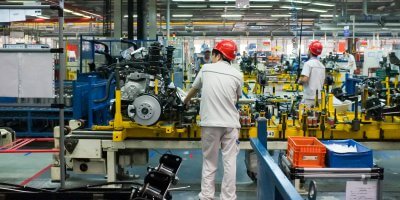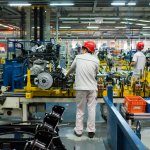
In efforts to revitalize its businesses, Hong Kong has been investing in emerging technology such as IoT. Source: Shutterstock
Can Hong Kong really prepare its businesses to leverage IoT?
FOR the past two decades, Hong Kong has successfully cemented its position as an important business capital in the APAC, thanks to the progressive government policies that favor a free-market enterprise.
The former British colony turner autonomous territory has been topping the Heritage Foundation’s Index of Economic Freedom for the last 25 year.
However, the recent rise of neighboring cities, such as Shanghai, Shenzhen, and Singapore challenging its status as a business hub in the region prompted Hong Kong to explore emerging technologies reinvent its industries and drive innovation within its borders, to attract the best the and brightest.
And one such futuristic technology that Hong Kong decided to pursue and invest in, is the internet of things (IoT) – interconnected devices and sensors that collect and transmit data to drive automation and power big data analytics.
Driving thought leadership via R&D
According to report by law firm Osborne Clarke produced in association with digital publishers Conventus Law, Hong Kong government’s interest in IoT dates back to 2014 when its leaders acknowledged the importance of the technology in its Digital 21 Strategy, a regularly updated set of initiatives to position the city as a leading digital city to sustain its advanced economy.
In 2017, Hong Kong revealed its Smart City Blueprint, detailing over 70 initiatives to develop six major areas aimed to rejuvenate some of its industries while spurring additional investment into innovative projects and smart factories.
While attracting manufacturing operations to the city unrealistic, given its close proximity to China, Hong Kong has focused much of its efforts into being a center that develops the innovative and futuristic industrial solution that is driven by IoT and its vast talent pool.
To that end, the government has invested in a series of multi-billion dollar projects such as Science Park expansion, the Data Technology Hub, the Advanced Manufacturing Centre, and the Hong Kong-Shenzhen Innovation and Technology Park.
The initiatives seem to bear fruit, as China-based, world largest drone producer moved its R&D operations to Hong Kong from Shenzen in 2015 and its a matter time until others follow suit.
IoT to revitalize logistics
In addition to R&D, Hong Kong is also keen to increase the uptake of IoT within is logistics and shipping industries to remain relevant in the wake of increased competition from neighboring China.
The Osbourne Clarke report also highlights that most of Hong Kong’s third-party logistics (3PLs) providers have been sluggish to keep their platform up-to-date, making cross-platform integration a real challenge.
And thus, while IoT is rightfully recognized as a crucial element that could further propel Hong Kong’s drive for innovation and boost its economy, it remains unclear, whether its businesses are prepared to leverage the technology to add further value to their operation.
So, Hong Kong may stand benefit from taking a leaf out of China or Singapore’s playbook to spur the adoption of IoT by its enterprises.
READ MORE
- Ethical AI: The renewed importance of safeguarding data and customer privacy in Generative AI applications
- How Japan balances AI-driven opportunities with cybersecurity needs
- Deploying SASE: Benchmarking your approach
- Insurance everywhere all at once: the digital transformation of the APAC insurance industry
- Google parent Alphabet eyes HubSpot: A potential acquisition shaping the future of CRM






